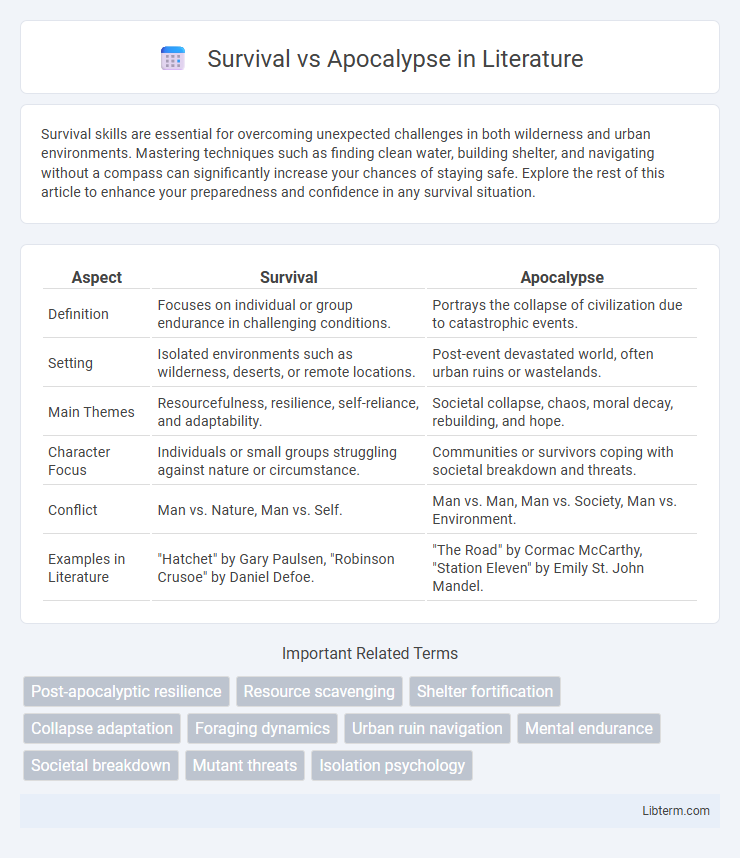Survival skills are essential for overcoming unexpected challenges in both wilderness and urban environments. Mastering techniques such as finding clean water, building shelter, and navigating without a compass can significantly increase your chances of staying safe. Explore the rest of this article to enhance your preparedness and confidence in any survival situation.
Table of Comparison
| Aspect | Survival | Apocalypse |
|---|---|---|
| Definition | Focuses on individual or group endurance in challenging conditions. | Portrays the collapse of civilization due to catastrophic events. |
| Setting | Isolated environments such as wilderness, deserts, or remote locations. | Post-event devastated world, often urban ruins or wastelands. |
| Main Themes | Resourcefulness, resilience, self-reliance, and adaptability. | Societal collapse, chaos, moral decay, rebuilding, and hope. |
| Character Focus | Individuals or small groups struggling against nature or circumstance. | Communities or survivors coping with societal breakdown and threats. |
| Conflict | Man vs. Nature, Man vs. Self. | Man vs. Man, Man vs. Society, Man vs. Environment. |
| Examples in Literature | "Hatchet" by Gary Paulsen, "Robinson Crusoe" by Daniel Defoe. | "The Road" by Cormac McCarthy, "Station Eleven" by Emily St. John Mandel. |
Understanding Survival: Key Concepts
Survival centers on mastering essential skills such as shelter-building, water purification, and food sourcing to maintain life in challenging environments. Understanding survival involves recognizing physiological needs, risk management, and adaptive problem-solving techniques crucial for sustaining well-being during crises. Core concepts include situational awareness, resourcefulness, and mental resilience to overcome adversity and unpredictable conditions.
Defining Apocalypse: Myths vs Reality
The apocalypse often blends mythic imagery of cataclysmic destruction with scientific likelihood, creating myths such as sudden planetary annihilation while reality points to gradual environmental or societal collapse. Apocalyptic scenarios in survival discourse emphasize understanding tangible threats like climate change, pandemics, or nuclear fallout versus supernatural or exaggerated narratives. Clarifying these distinctions is crucial for effective preparedness, resilience-building, and resource management in survival strategies.
Essential Skills for Survival in Extreme Scenarios
Mastering essential survival skills such as fire-building, water purification, and food foraging significantly increases the chances of enduring extreme scenarios in apocalyptic conditions. Understanding navigation techniques, basic first aid, and shelter construction provides critical support for maintaining health and safety during prolonged emergencies. Developing mental resilience and situational awareness further enhances adaptability in unpredictable and hostile environments.
Types of Apocalypse: Natural, Man-Made, and Fictional
Survival strategies vary significantly depending on the type of apocalypse faced: natural, man-made, or fictional. Natural apocalypses include events like earthquakes, tsunamis, and pandemics, requiring preparedness for environmental hazards and resource scarcity. Man-made apocalypses encompass nuclear war, chemical spills, and cyber-attacks, demanding knowledge of containment, radiation protection, and digital resilience, while fictional apocalypses, such as zombie outbreaks or alien invasions, often emphasize adaptive combat skills and psychological endurance.
Survival Mindset: Preparation vs Panic
A survival mindset hinges on rigorous preparation, including the development of skills, resource management, and mental resilience, which significantly increases the chance of overcoming life-threatening scenarios. In contrast, panic triggers impulsive decisions and paralysis, undermining effective responses during crises such as natural disasters or societal collapse. Training in situational awareness and stress management anchors individuals in proactive behavior, ensuring clarity and control in apocalyptic events.
Critical Resources: Food, Water, Shelter
Critical resources such as food, water, and shelter are paramount for survival during an apocalypse, where supply chains collapse and access to essentials becomes scarce. Reliable sources of clean water, non-perishable food supplies, and fortified shelter directly impact the ability to withstand environmental hazards and social unrest. Efficient resource management and sustainable methods like rainwater collection, rationing caloric intake, and constructing insulated shelters enhance long-term survival prospects in extreme conditions.
Tools and Technology in Post-Apocalyptic Worlds
Tools and technology in post-apocalyptic worlds are crucial for survival, often combining scavenged materials with improvised innovation to create essential gear such as water filters, solar chargers, and makeshift weapons. Advanced knowledge of mechanical repair, foraging tools, and renewable energy devices significantly increases chances of sustaining life in environments where traditional infrastructure is destroyed. Mastery of communication devices like radios and basic medical technology further enhances both individual and community resilience amidst chaos.
Social Dynamics: Trust and Community in Crisis
In survival and apocalypse scenarios, social dynamics hinge on trust and community cohesion, which become essential for resource sharing and mutual protection. Establishing reliable alliances mitigates risks of betrayal and enhances group resilience against external threats. Strong social bonds foster cooperation, emotional support, and collective problem-solving critical for long-term survival in crisis conditions.
Psychological Impact: Coping with Apocalypse
Survival in an apocalypse demands intense psychological resilience as individuals face trauma, loss, and constant uncertainty. Coping mechanisms such as establishing routine, maintaining social connections, and mental preparedness significantly mitigate stress and prevent psychological breakdown. Understanding the psychological impact is crucial for developing effective strategies that enhance emotional endurance in post-apocalyptic scenarios.
Future Trends: Learning from Survival Stories
Future trends in survival emphasize integrating lessons from past apocalypse narratives to enhance preparedness strategies and resilience planning. Data from survival stories reveal patterns in resource management, psychological endurance, and adaptive technologies critical for overcoming extreme crises. Innovations in survival gear and community-based response systems increasingly reflect insights derived from real-world experiences and speculative apocalyptic scenarios.
Survival Infographic

 libterm.com
libterm.com